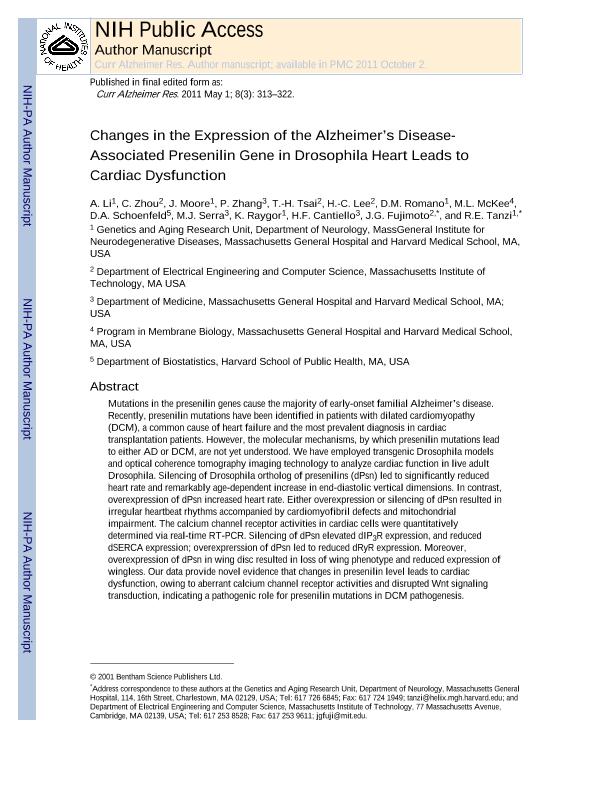Mostrar el registro sencillo del ítem
dc.contributor.author
Li, A.
dc.contributor.author
Zhou, C.
dc.contributor.author
Moore, J.
dc.contributor.author
Zhang, P.
dc.contributor.author
Tsai, T. H.
dc.contributor.author
Lee, H. C.
dc.contributor.author
Romano, D. M.
dc.contributor.author
McKee, M. L.
dc.contributor.author
Schoenfeld, D. A.
dc.contributor.author
Serra, M. J.
dc.contributor.author
Raygor, K.
dc.contributor.author
Cantiello, Horacio Fabio

dc.contributor.author
Fujimoto, J. G.
dc.contributor.author
Tanzi, R. E.
dc.date.available
2017-02-13T19:37:48Z
dc.date.issued
2011-04
dc.identifier.citation
Li, A.; Zhou, C.; Moore, J.; Zhang, P.; Tsai, T. H.; et al.; Changes in the Expression of the Alzheimer's Disease-Associated Presenilin Gene in Drosophila Heart Leads to Cardiac Dysfunction; Bentham Science Publishers; Current Alzheimer Research; 8; 3; 4-2011; 313-322
dc.identifier.issn
1567-2050
dc.identifier.uri
http://hdl.handle.net/11336/12912
dc.description.abstract
Mutations in the presenilin genes cause the majority of early-onset familial Alzheimers disease. Recently, presenilin mutations have been identified in patients with dilated cardiomyopathy (DCM), a common cause of heart failure and the most prevalent diagnosis in cardiac transplantation patients. However, the molecular mechanisms, by which presenilin mutations lead to either AD or DCM, are not yet understood. We have employed transgenic Drosophila models and optical coherence tomography imaging technology to analyze cardiac function in live adult Drosophila. Silencing of Drosophila ortholog of presenilins (dPsn) led to significantly reduced heart rate and remarkably age-dependent increase in end-diastolic vertical dimensions. In contrast, overexpression of dPsn increased heart rate. Either overexpression or silencing of dPsn resulted in irregular heartbeat rhythms accompanied by cardiomyofibril defects and mitochondrial impairment. The calcium channel receptor activities in cardiac cells were quantitatively determined via real-time RT-PCR. Silencing of dPsn elevated dIP3R expression, and reduced dSERCA expression; overexprerssion of dPsn led to reduced dRyR expression. Moreover, overexpression of dPsn in wing disc resulted in loss of wing phenotype and reduced expression of wingless. Our data provide novel evidence that changes in presenilin level leads to cardiac dysfunction, owing to aberrant calcium channel receptor activities and disrupted Wnt signaling transduction, indicating a pathogenic role for presenilin mutations in DCM pathogenesis.
dc.format
application/pdf
dc.language.iso
eng
dc.publisher
Bentham Science Publishers

dc.rights
info:eu-repo/semantics/openAccess
dc.rights.uri
https://creativecommons.org/licenses/by-nc-sa/2.5/ar/
dc.subject
Alzheimer'S Disease-Associated Presenilin Gene
dc.subject
Cardiac Disfunction
dc.subject.classification
Otras Medicina Básica

dc.subject.classification
Medicina Básica

dc.subject.classification
CIENCIAS MÉDICAS Y DE LA SALUD

dc.title
Changes in the Expression of the Alzheimer's Disease-Associated Presenilin Gene in Drosophila Heart Leads to Cardiac Dysfunction
dc.type
info:eu-repo/semantics/article
dc.type
info:ar-repo/semantics/artículo
dc.type
info:eu-repo/semantics/publishedVersion
dc.date.updated
2017-02-09T18:23:03Z
dc.journal.volume
8
dc.journal.number
3
dc.journal.pagination
313-322
dc.journal.pais
Emiratos Árabes Unidos

dc.journal.ciudad
Sharjah
dc.description.fil
Fil: Li, A.. Harvard Medical School; Estados Unidos
dc.description.fil
Fil: Zhou, C.. Massachusetts Institute of Technology; Estados Unidos
dc.description.fil
Fil: Moore, J.. Harvard Medical School; Estados Unidos
dc.description.fil
Fil: Zhang, P.. Harvard Medical School; Estados Unidos
dc.description.fil
Fil: Tsai, T. H.. Massachusetts Institute of Technology; Estados Unidos
dc.description.fil
Fil: Lee, H. C.. Massachusetts Institute of Technology; Estados Unidos
dc.description.fil
Fil: Romano, D. M.. Harvard Medical School; Estados Unidos
dc.description.fil
Fil: McKee, M. L.. Harvard Medical School; Estados Unidos
dc.description.fil
Fil: Schoenfeld, D. A.. Harvard University. Harvard School Of Public Health; Estados Unidos
dc.description.fil
Fil: Serra, M. J.. Harvard Medical School; Estados Unidos
dc.description.fil
Fil: Raygor, K.. Harvard Medical School; Estados Unidos
dc.description.fil
Fil: Cantiello, Horacio Fabio. Harvard Medical School; Estados Unidos. Consejo Nacional de Investigaciones Científicas y Técnicas. Oficina de Coordinación Administrativa Houssay; Argentina
dc.description.fil
Fil: Fujimoto, J. G.. Massachusetts Institute of Technology; Estados Unidos
dc.description.fil
Fil: Tanzi, R. E.. Harvard Medical School; Estados Unidos
dc.journal.title
Current Alzheimer Research

dc.relation.alternativeid
info:eu-repo/semantics/altIdentifier/url/http://www.eurekaselect.com/87978/article
dc.relation.alternativeid
info:eu-repo/semantics/altIdentifier/doi/http://dx.doi.org/10.2174/156720511795563746
dc.relation.alternativeid
info:eu-repo/semantics/altIdentifier/url/https://www.ncbi.nlm.nih.gov/pmc/articles/PMC3179576/
Archivos asociados
